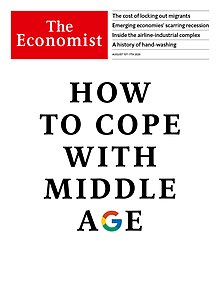 | |
 Cover of the 1 August 2020 issue | |
| Type | Weekly newspaper[1][2] (Friday) |
|---|---|
| Format |
|
| Owner(s) | The Economist Group |
| Founder(s) | James Wilson |
| Editor | Zanny Minton Beddoes |
| Deputy editor | Tom Standage |
| Founded | September 1843 |
| Political alignment | Radical centrism[3][4] Economic liberalism[5][6] Social liberalism[5][6] |
| Headquarters | 1-11 John Adam Street Westminster, London, England |
| Circulation | 490,944 (as of 2023)[7] |
| ISSN | 0013-0613 |
| Website | www |
The Economist is a weekly newspaper published in printed magazine format and digitally. It focuses on current affairs, international business, politics, technology, and culture, and is mostly written and edited in Britain.[8] Based in London, the newspaper is owned by the Economist Group, with its core editorial offices in the United States, as well as across major cities in continental Europe, Asia, and the Middle East.[1][8] The newspaper has a prominent focus on data journalism and interpretive analysis over original reporting, to both criticism and acclaim.
Founded in 1843, The Economist was first circulated by Scottish economist James Wilson to muster support for abolishing the British Corn Laws (1815–1846), a system of import tariffs. Over time, the newspaper's coverage expanded further into political economy and eventually began running articles on current events, finance, commerce, and British politics. Throughout the mid-to-late 20th century, it greatly expanded its layout and format, adding opinion columns, special reports, political cartoons, reader letters, cover stories, art critique, book reviews, and technology features. The paper is recognisable by its fire engine red masthead (nameplate) and illustrated, topical covers. Individual articles are written anonymously, with no byline, in order for the paper to speak as one collective voice. It is supplemented by its sister lifestyle magazine, 1843, and a variety of podcasts, films, and books. It is considered a newspaper of record in the UK.[9]
The editorial stance of The Economist primarily revolves around classical, social, and most notably economic liberalism. It has supported radical centrism, favouring policies and governments that maintain centrist politics. The newspaper typically champions economic liberalism, particularly free markets, free trade, free immigration, deregulation, and globalisation. Despite a pronounced editorial stance, it is seen as having little reporting bias, and as exercising rigorous fact-checking and strict copy editing.[10][11] Its extensive use of word play, high subscription prices, and depth of coverage has linked the paper with a high-income and educated readership, drawing both positive and negative connotations.[8][12] In line with this, it claims to have an influential readership of prominent business leaders and policy-makers.[13]
- ^ a b Bloomgarden-Smoke, Kara (2 September 2013). "The Economist Is a Newspaper, Even Though It Doesn't Look Like One". Observer. Archived from the original on 9 August 2020.
- ^ Iber, Patrick (17 December 2019). "The World the Economist Made". The New Republic. ISSN 0028-6583. Archived from the original on 23 April 2020. Retrieved 8 April 2020.
- ^ "Is The Economist left- or right-wing?". The Economist. 2 September 2013. Archived from the original on 3 August 2017. Retrieved 24 April 2016.
- ^ "True Progressivism". The Economist. 13 October 2012. Archived from the original on 15 October 2016. Retrieved 16 October 2016.
- ^ a b Zevin, Alexander (20 December 2019). "Liberalism at Large — how The Economist gets it right and spectacularly wrong". Financial Times. Archived from the original on 10 December 2022. Retrieved 11 March 2020.
- ^ a b Mishra, Pankaj. "Liberalism According to The Economist". The New Yorker. Archived from the original on 17 July 2020. Retrieved 9 April 2020.
- ^ "The Economist". Audit Bureau of Circulations. 20 February 2024. Archived from the original on 2 July 2022. Retrieved 29 May 2024.
- ^ a b c Peters, Jeremy W. (8 August 2010). "The Economist Tends Its Sophisticate Garden". The New York Times. ISSN 0362-4331. Archived from the original on 14 June 2020.
- ^ Corey Frost; Karen Weingarten; Doug Babington; Don LePan; Maureen Okun (30 May 2017). The Broadview Guide to Writing: A Handbook for Students (6th ed.). Broadview Press. pp. 27–. ISBN 978-1-55481-313-1. Archived from the original on 29 June 2023. Retrieved 9 March 2020.
- ^ Pressman, Matt (20 April 2009). "Why Time and Newsweek Will Never Be The Economist". Vanity Fair. Archived from the original on 23 September 2020. Retrieved 11 March 2020.
- ^ Leadership, The Berlin School Of Creative (1 February 2017). "10 Journalism Brands Where You Find Real Facts Rather Than Alternative Facts". Forbes. Archived from the original on 12 February 2020. Retrieved 10 March 2020.
- ^ Burnell, Ian (31 January 2019). "Why The Economist swapped its famous elitist marketing for emotional messaging". The Drum. Archived from the original on 9 August 2020. Retrieved 11 March 2020.
- ^ Gates, Bill (8 March 2010). "Where can I get unbiased news?". GatesNotes - the blog of Bill Gates. 2024 The Gates Notes LLC. Retrieved 3 April 2024.